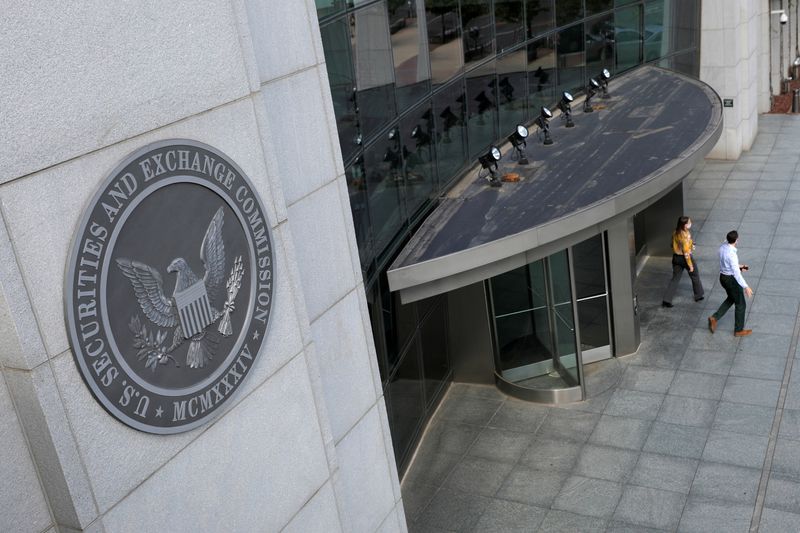
© Reuters. FILE PHOTO: People exit the headquarters of the U.S. Securities and Exchange Commission (SEC) in Washington, D.C., U.S., May 12, 2021. Picture taken May 12, 2021. REUTERS/Andrew Kelly
By Niket Nishant, Hannah Lang, Chris Prentice and Luc Cohen
(Reuters) -Alex Mashinsky, the founder and former CEO of bankrupt cryptocurrency lender Celsius Network, was arrested and charged with fraud, a U.S. prosecutor in New York said Thursday, while three federal regulatory agencies sued him and his company.
Mashinsky, 57, was charged with seven criminal counts – including securities fraud, commodities fraud and wire fraud – while Celsius’ former chief revenue officer, Roni Cohen-Pavon, was charged with four criminal counts, according to the indictment, which was unsealed on Thursday.
Prosecutors and federal regulators accused Mashinsky of misleading customers and of artificially inflating the value of his Hoboken, New Jersey-based company’s proprietary crypto token.
Lawyers for Mashinsky and Celsius did not immediately respond to requests for comment, and Cohen-Pavon’s attorney could not immediately be reached.
Mashinsky is one of several crypto moguls to be indicted in another blow for the industry, which is undergoing a reckoning after a slump in crypto prices led to the collapse of several companies, including exchange giant FTX. Its founder Sam Bankman-Fried was charged with fraud last year, and has pleaded not guilty.
“Whether it’s old-school fraud or some new-school crypto scheme, it doesn’t matter one bit. It’s all fraud to us,” U.S. Attorney Damian Williams said at a press conference detailing the charges.
Mashinsky will appear before a U.S. magistrate judge in Manhattan on Thursday afternoon, Williams’ office said.
‘PROFITS IN YOUR POCKET’
Founded in 2017, Celsius filed for Chapter 11 bankruptcy protection in July 2022 year after customers rushed to withdraw deposits as crypto prices fell. Many have been unable to access their funds.
Crypto lenders such as Celsius grew rapidly as crypto prices surged during the COVID-19 pandemic. They promised easy loan access and eye-popping interest rates to depositors, then lent out tokens to institutional investors, hoping to profit from the difference.
Celsius was among the first in a series of bankruptcies in the cryptocurrency sector last year as token prices cratered amid rising interest rates and stubbornly high inflation. It filed for bankruptcy shortly after Singapore-based crypto hedge fund Three Arrows Capital and rival crypto lender Voyager Digital did the same.
Mashinsky and Cohen-Pavon were charged with market manipulation of the company’s crypto token, known as Cel, as well as a fraudulent scheme to manipulate the price of the cryptocurrency and wire fraud related to the manipulation of the token, according to the indictment.
Prosecutors alleged Mashinsky also personally reaped approximately $42 million in proceeds from selling his holdings of the Cel token.
Williams said at the press conference that Cohen-Pavon is located abroad and is an Israeli citizen, but declined to comment on whether the former Celsius executive would be extradited.
The U.S. Securities and Exchange Commission (SEC) also sued Mashinsky and Celsius on Thursday, according to a court filing, alleging he and his firm raised billions of dollars through the sale of unregistered crypto securities and misled investors about the financial state of the privately held company.
The SEC, along with other regulators which also filed lawsuits Thursday, accused Mashinsky and his company of touting Celsius as safe – akin to a traditional bank – even as they took increasingly risky steps to deliver promised returns of as much as 17%.
Celsius used emails with phrases like “Pour Yourself a Cup of Profits” and “Profits in your Pocket” to promote its interest-earning program.
While the firm lost millions of dollars as customers raced to withdraw funds, Mashinsky and Celsius continued to claim the company was financially secure and had enough funds to meet withdrawals, regulators said.
The SEC also said Celsius engaged in “risky trading practices” and made uncollateralized loans, despite telling investors that it did not. The company also falsely claimed to have raised $50 million from its initial token sale, and claimed to have 1 million active users when in fact it only ever had around 500,000 depositors, many of whom were no longer active, the SEC said.
The U.S. Commodity Futures Trading Commission and the Federal Trade Commission also sued Celsius and Mashinsky. The FTC said it had reached a settlement with Celsius that will permanently ban it from handling customers’ assets.
The Justice Department entered into a non-prosecution agreement with Celsius, in which the company accepted responsibility for its role in the alleged schemes and pledged to continue cooperating with investigators, Williams said,
Thursday’s lawsuits add to a series of challenges for Celsius Network and its founder. In January, New York state’s attorney general sued Mashinsky, also alleging fraud.
The crypto industry has been on even shakier ground since the SEC sued crypto exchanges Binance and Coinbase (NASDAQ:) Global last month raised risks of further regulatory challenges for the sector.
Stay connected with us on social media platform for instant update click here to join our Twitter, & Facebook
We are now on Telegram. Click here to join our channel (@TechiUpdate) and stay updated with the latest Technology headlines.
For all the latest Business News Click Here
For the latest news and updates, follow us on Google News.
